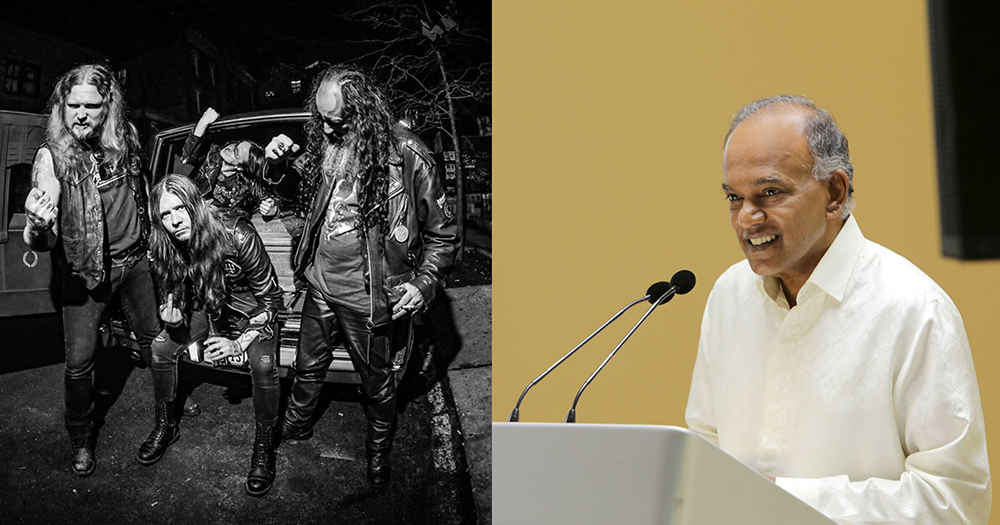To allow Watain to perform is to set a precedent in allowing future performances imbued with hate speech into Singapore.
And the logical conclusion of this precedent is the normalisation of hate speech in society.
This was the thrust of Home Affairs and Law Minister K Shanmugam's ministerial statement in Parliament on April 1, which focused on restricting hate speech in Singapore to maintain society's racial and religious harmony.
Watain denigrates Christianity and promotes terrorism
In explaining why this was the case, Shanmugam stated that the lyrics and beliefs of Watain denigrated Christianity in a highly offensive manner.
Shanmugam highlighted that while being interviewed by Revolver, Watain's frontman, Erik Danielsson said:
“I wish we could have a little more daring opponents and enemies. All of our enemies are Christian sheep who don’t dare to confront their enemy. We go about doing our thing, pissing in their living rooms while they sit still and watch their TV shows.”
Shanmugam also pointed out that Danielsson had encouraged acts of terrorism in the band's name.
He cited Danielsson's interview with Metal Blast, in which the latter had stated:
"That wouldn’t be a misunderstanding, that would be taking things in the very right way, and I totally encourage any kind of terrorist acts committed in the name of Watain, absolutely, that’s the way rock and roll works."
Shanmugam said that Danielsson then doubled down on his comments, even after the interviewer asked him if he was sure he wanted his statement published, in which he added:
"Yes, sure, absolutely. We’ve always been encouraging music to take a physical form, and that’s what happened in Norway in the early 90’s when churches were burned, and it happened many other times as well. To me it’s the very natural consequence of rock n’ roll, in the end, being the Devil’s music. It consists of energies that, at some point, need to manifest and they will, no matter if people want it or not, they will manifest."
Allowing Watain to perform normalises hate speech
Shanmugam stated that with all of this in mind, should the band still be allowed to perform, it will mean that the Singapore government will also have to allow other such concerts to perform in Singapore.
In giving examples of other similar concerts, Shanmugam stated that this meant allowing bands such as those that played Malay Power music, which drew inspiration from Nazism, called for Malaysia to be an exclusively Malay nation and the expelling of all non-Malays from Malaysia.
Shanmugam added that the government would also have to allow as-of-yet-non-existent Chinese Power music to be played as well.
Additionally the allowance of such concerts would also have to be extended to other forms of visual arts.
Here, Shanmugam asked if this also meant allowing religiously-offensive cartoons of Charlie Hebdo to be published and the mass media reprinting the 2005 Danish cartoons mocking Prophet Muhammad.
Are those unhappy with the Watain ban willing to accept the consequences of their position then?
In recognising those who disagreed with the ban, Shanmugam noted that Singaporeans such as Chew Wei Shan raised points that were valid, but only in isolation, and generally missed the larger picture, as painted above.
This led to Shanmugam directly rebutting those who disagreed with the ban, in which he questioned if they accepted the following consequences of their position:
- That fault lines between different races and religions could become greater,
- That hate speech could become normalised,
- That they accepted all consequences of that,
- and that they still think that Singapore should have freedom to have hate speech in entertainment, regardless of the consequences.
Shanmugam also wondered if those who disagreed would also be willing to say that they accepted similar concerts attacking Islam, Buddhism and other religions.
Hate speech engages the brain centre for threats
Speaking on the dangers that hate speech posed to society, Shanmugam cited studies which showed that hate speech engaged the amygdala, the brain centre for threats.
Shanmugam noted that such speeches stoked fear and anger, provided a surge of stress hormones and could result in a person becoming disengaged with their morality.
In citing examples of music that promoted hatred, Shanmugam highlighted the cancellation of a recent music festival in Malaysia which featured Malay Power music, as an indication that such a phenomenon was all around Singapore.
Singapore's government is secular but not in the French sense of secularism
Shanmugam then turned to addressing whether Singapore should adopt a hands-off approach and added that this was effectively the French definition of secularism in which the right of anyone to vilify a religion is absolute.
This meant taking a hands-off approach in which cartoons, offensive material, ridicule and hate speech could be directed at any religion.
Singapore's secularism however, Shanmugam clarified, is one in which the government is completely neutral, does not privilege any religious group, nor allow any religious group to be insulted and attacked.
As such, it is a government that also guarantees freedom of religion and protects all, including minorities, from threats and violence.
Top image collage from Watain Facebook and Shanmugam Facebook
If you like what you read, follow us on Facebook, Instagram, Twitter and Telegram to get the latest updates.
